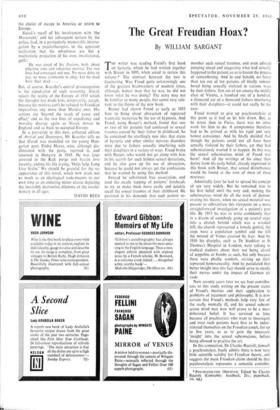The Revolutionary
FIRST published in 1943, Koestler's Arrival and Departure was rightly seen at the time as an indispensable guide-book to a world where 'there was now a war in a triangle; one side was utopia betrayed, the second tradition decayed; the third destruction arrayed.' The conflict of ends and means was seen through the middle-class revolu- tionary, Peter Slavek, who, having escaped from occupied Europe to Neutralia—the evocation of war-time Portugal is one of the best things in the book—undergoes a breakdown when faced with the choice of escape to America or return to Europe.
Slavek's recall of his involvement with 'the Movement,' and his subsequent torture by the police, lead, in a particularly memorable interro- gation by a psychotherapist, to the apparent realisation that his adventures are but a mechanistic projection of his own, involutional, guilt:
He was cured of his illusions, both about objective aims and subjective motives. The two lines had converged and met. No more debts to pay, no more commands to obey. Let the dead bury their dead . . .
But, of course, Koestler's central preoccupation is the repudiation of such reasoning. Slavek rejects the reality of the Europe of 1943 which the therapist has made him, temporarily, accept, because his motives can't be reduced to Freudian imperatives any more than Marxist ones. His actions are 'beyond the reach of cause and effect,' and so the two lines of expediency and morality diverge again as Slavek moves to England and so back to occupied Europe.
In a postscript to this new, collected edition of Arrival and Departure, Mr Koestler tells us that Slavek was modelled on the young Hun- garian poet, Endre Havas, who, although dis- illusioned with the party, rejoined it, and returned to Hungary in 1945. He was later arrested in the Rajk purge and beaten into insanity, ending his life crying, 'Help, help, Long Live Stalin.' We should be grateful for the re- appearance of this novel, which now reads not so much as an ideological vade-mecum to our own time as an enduring minor classic depicting the inevitably destructive dilemma of the revolu- tionary in all ages.
DAVID REES















































 Previous page
Previous page